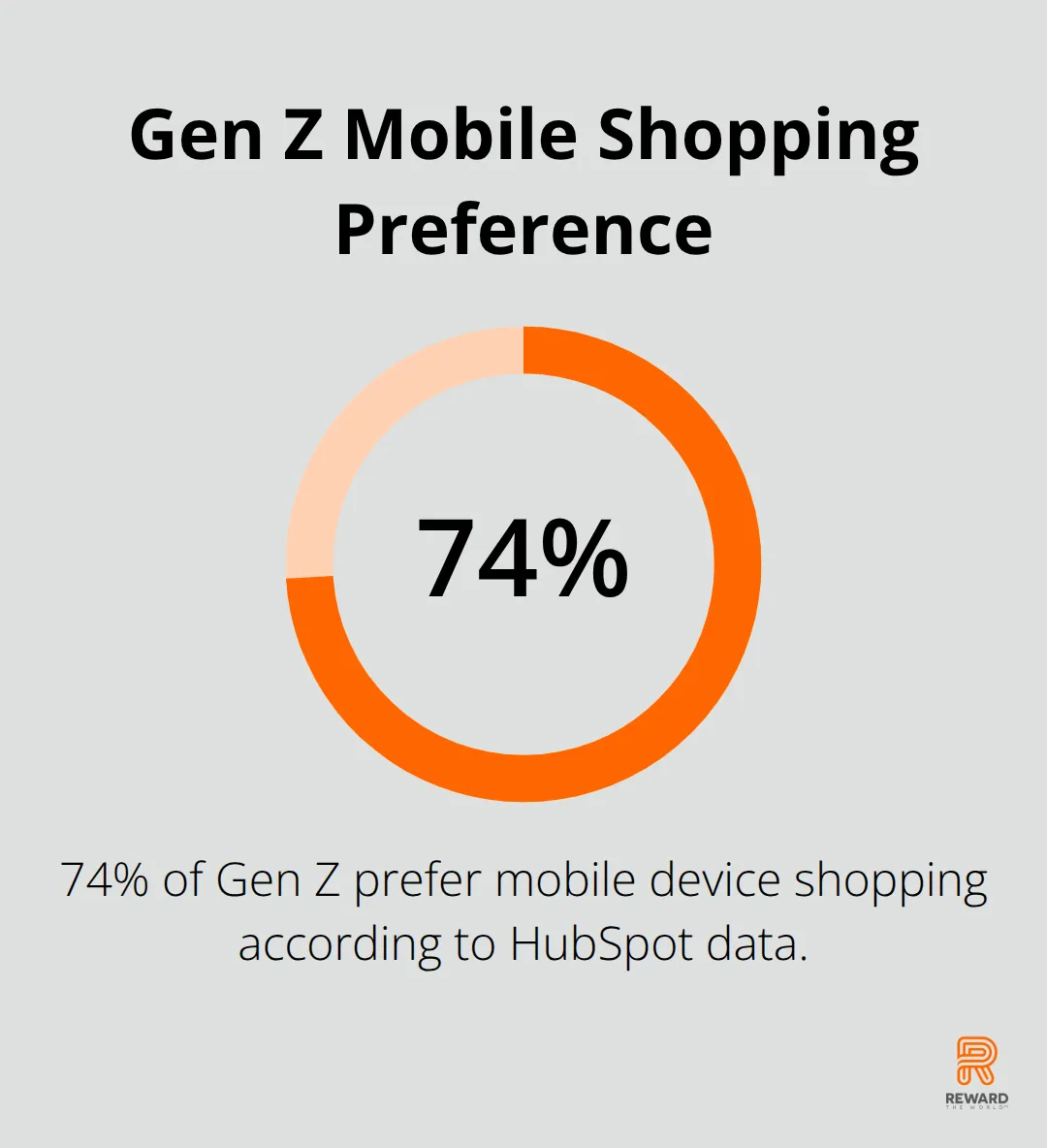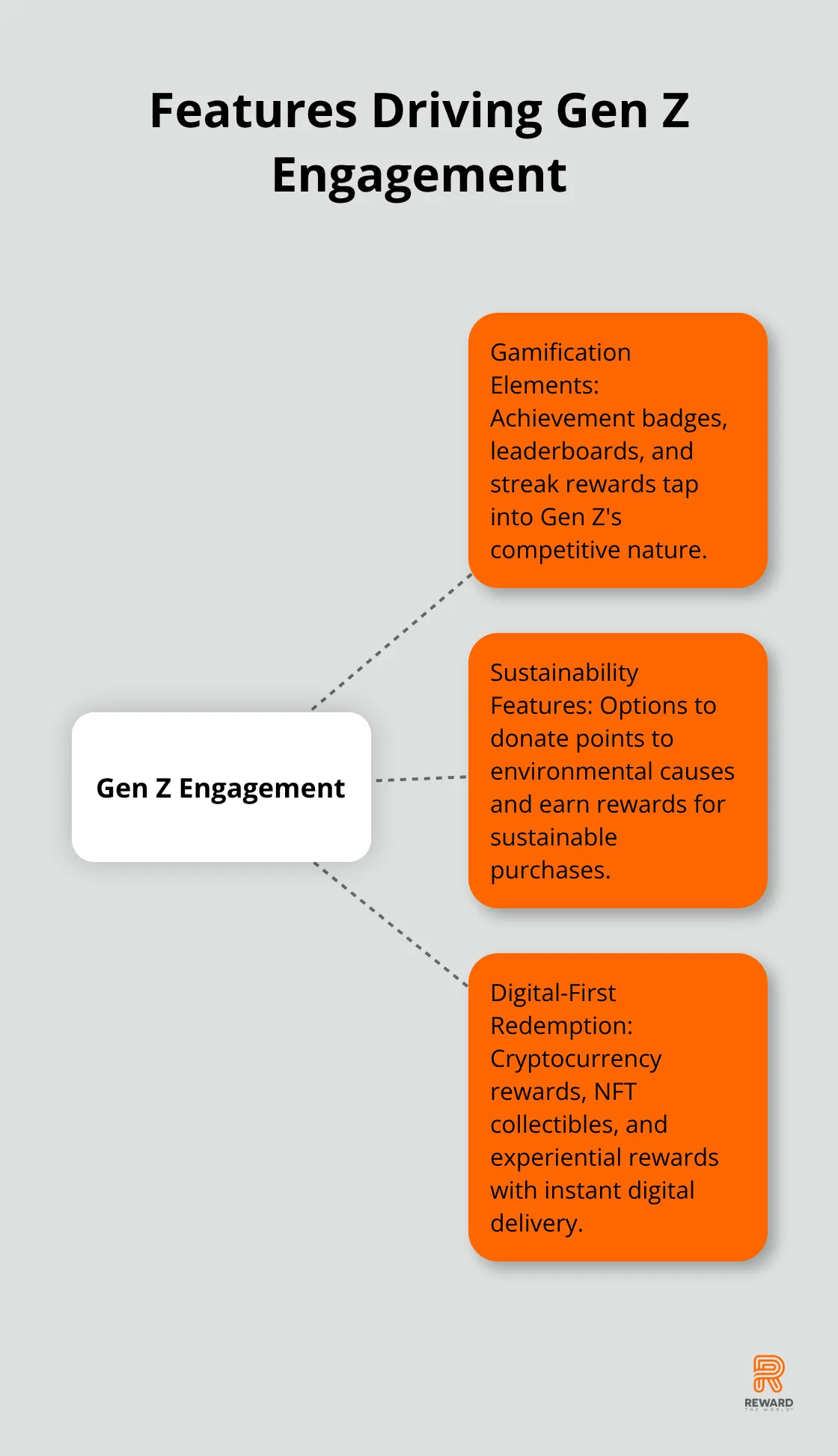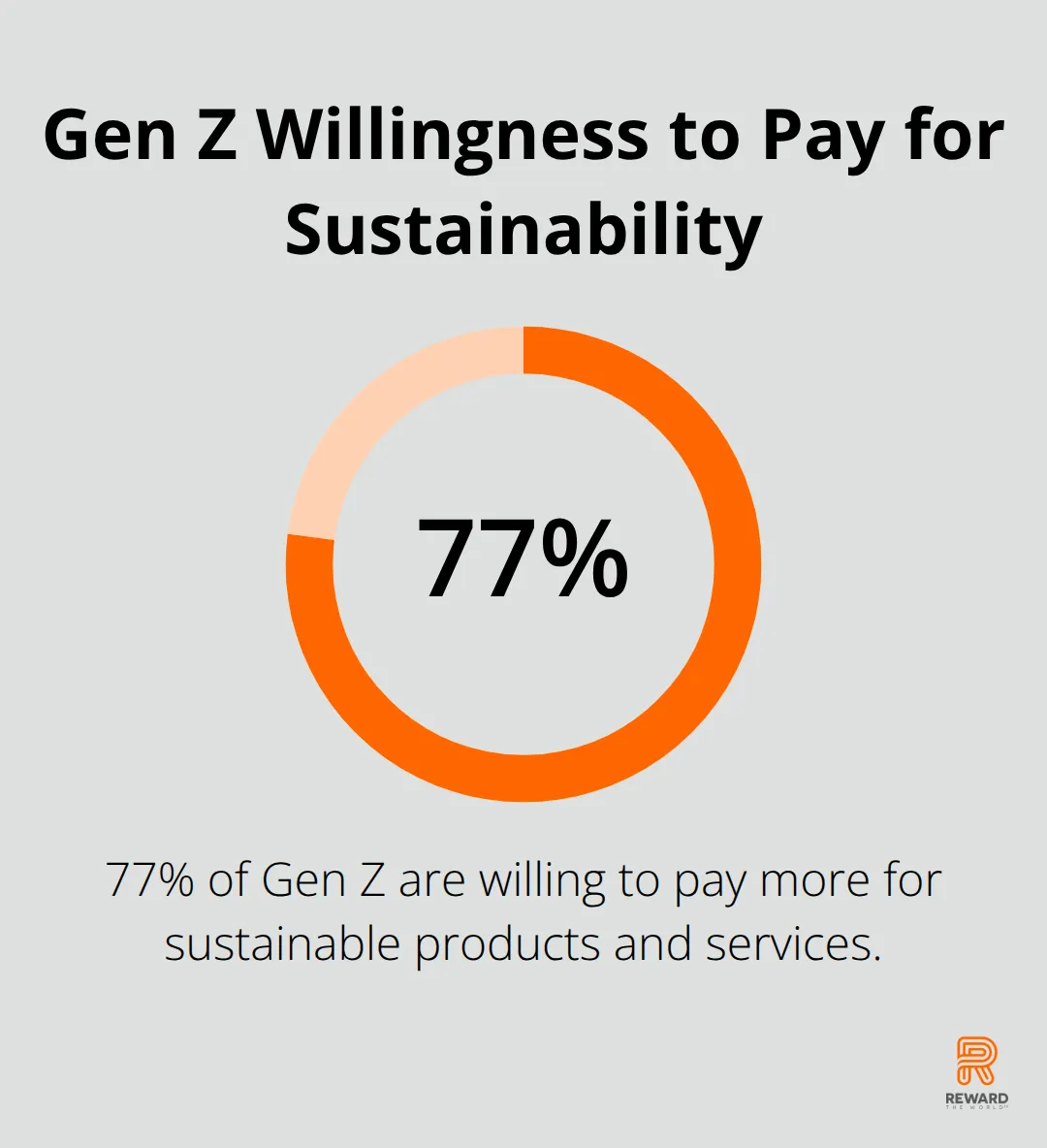
Gen Z represents 40% of global consumers and their expectations are reshaping loyalty programs worldwide. Traditional point systems and email campaigns simply don’t work for this digital native loyalty generation.
We at Reward the World see brands struggling to connect with Gen Z through outdated reward strategies. This generation demands instant recognition, personalized experiences, and values-driven partnerships that align with their social consciousness.
What Does Gen Z Actually Expect from Rewards?
Gen Z consumers abandon loyalty programs within seconds if they don’t see immediate value. Research from Accenture shows that leveraging gen AI can accurately predict future customer requirements with studies indicating an accuracy rate of 85-90%, while 74% prefer mobile device shopping according to HubSpot data. These statistics reveal the fundamental shift in reward program expectations that brands must address immediately.

Speed Beats Everything Else
Traditional loyalty programs that take weeks to process rewards are dead on arrival with Gen Z. Starbucks Rewards demonstrates this perfectly with their 34.3 million active users, achieving 13% year-over-year growth through instant point accumulation and real-time reward availability. Gen Z expects instant gratification and to redeem rewards within minutes, not days. Programs that require manual approval processes or delayed reward delivery lose participants within the first month.
Personalization Through Data, Not Demographics
Generic birthday discounts and mass email campaigns repel Gen Z consumers who expect AI-driven personalization. Successful programs analyze purchase history, social media behavior, and engagement patterns to offer relevant rewards. Sephora’s Beauty Insider Community exemplifies this approach through product recommendations based on individual skin concerns and beauty preferences, resulting in loyalty revenue increases to $607,000 by year three for participating brands. Gen Z consumers will share personal data willingly if they receive genuinely useful recommendations and exclusive access to products that match their specific interests and values.
Mobile-Native Social Integration
Desktop-focused loyalty programs fail immediately with Gen Z, who conduct 74% of their shopping on mobile devices. Instagram and TikTok integration drives program discovery, with 58% of Gen Z purchasing products they see on social media. Effective programs allow members to share rewards, compete with friends, and showcase their loyalty status across social platforms. The most successful programs embed sharing features directly into the mobile app experience rather than treat social media as an afterthought.
These foundational expectations form just the beginning of what Gen Z demands from modern reward programs. The specific features that actually attract and retain this generation go far beyond basic speed and personalization.
What Features Actually Drive Gen Z Engagement

Gamification Elements That Create Competition
Gen Z demands reward programs that function like their favorite video games and social apps. Gamification transforms boring point accumulation into competitive experiences that maintain long-term engagement. Successful programs incorporate achievement badges, leaderboards, and streak rewards that tap into Gen Z’s competitive nature.
Nike’s SNKRS app demonstrates this perfectly through exclusive drop notifications and limited-time challenges that create urgency and community competition. Programs that offer daily check-in bonuses, progress bars, and milestone celebrations see enhanced engagement among loyalty members according to tiered program data from beauty brands like Astrid & Miyu.
Sustainability Features That Match Values
Environmental consciousness drives purchasing decisions according to research, making sustainability features non-negotiable for modern reward programs. Effective programs allow members to donate points to environmental causes, earn rewards for sustainable purchases, or participate in brand-sponsored community cleanups.
MoxieLash successfully integrates social media engagement with values-based rewards, resulting in members spending 1.5 times more than non-members. Gen Z expects brands to demonstrate authentic commitment to environmental causes through their reward structures (not just marketing messages).
Digital-First Redemption Options
Gen Z expects digital-first redemption options including cryptocurrency rewards, NFT collectibles, and experiential rewards like concert tickets or exclusive brand collaborations. Programs that offer flexible point transfers between categories and instant digital delivery capture Gen Z attention immediately.
The most successful programs provide global marketplace access with over 60 million reward options across categories, allowing personalized redemption that matches individual interests rather than generic gift cards that feel impersonal and outdated. Instant delivery becomes the standard expectation rather than a premium feature.
However, even programs with perfect features can fail spectacularly when brands make fundamental mistakes in their approach to Gen Z communication and values alignment.
Why Most Gen Z Reward Programs Fail Immediately
Brands lose Gen Z participants within weeks through three critical mistakes that traditional loyalty programs repeat endlessly. Email-first communication strategies fail catastrophically with Gen Z, who make up 25% of the U.S. social media audience but ignore promotional emails entirely. Companies that rely on weekly newsletters and email promotions see Gen Z engagement rates below 5%, while SMS and push notifications achieve 45% open rates among this demographic.
Outdated Communication Channels Drive Immediate Exit
The most damaging mistake involves treating Instagram and TikTok as marketing afterthoughts rather than primary communication channels where Gen Z expects real-time updates about rewards, exclusive offers, and program changes. Brands that send reward notifications through email watch Gen Z members abandon programs within days, while companies that use push notifications and social media stories maintain active participation rates above 60%. Gen Z consumers expect brands to communicate through the same channels they use for personal interactions (not formal business correspondence that feels disconnected from their daily digital experience).
Generic Rewards Kill Engagement Fast
Mass-market gift cards and percentage discounts demonstrate complete misunderstanding of Gen Z expectations for hyper-personalized experiences. Successful programs like Sephora’s Beauty Insider analyze individual purchase patterns, social media activity, and personal preferences to offer targeted product samples and exclusive access opportunities. Generic birthday emails with standard 10% discounts generate immediate program abandonment, while AI-driven recommendations based on browsing history and social engagement create lasting loyalty. Programs that offer identical rewards to all members regardless of individual interests, values, or shopping behavior lose 73% of Gen Z participants within the first three months according to loyalty program research data.
Values Misalignment Destroys Trust Permanently
The most fatal error involves ignoring Gen Z’s values-driven purchasing decisions that prioritize sustainability, social justice, and ethical business practices over pure discounts. Research shows 34% of Gen Z consumers actively boycott brands that fail to take public stances on social issues, while 77% are willing to pay more for sustainable products and services. Programs that focus exclusively on transactional benefits without offering charitable donation options, sustainability rewards, or community impact initiatives lose credibility immediately. Brands that treat values-based motivations as optional features rather than core program elements face permanent Gen Z abandonment, as this generation views ethical alignment as non-negotiable rather than preferential.

Final Thoughts
Gen Z reward programs succeed when brands deliver instant rewards, mobile-first design, and values-driven partnerships that reflect social consciousness. Traditional point systems fail because they ignore digital native loyalty expectations for real-time recognition, AI-powered personalization, and sustainability features. Companies must abandon email-first communication for push notifications and social media updates that reach Gen Z where they spend their time.
Brands need immediate reward delivery, competitive elements, and social media integration to capture Gen Z attention. Programs require charitable donation options, environmental impact tracking, and community engagement features that align with ethical purchasing decisions. The most effective approach treats Gen Z as partners rather than transaction targets (offering meaningful experiences that reflect their values while delivering instant gratification).
We at Reward the World provide instant reward delivery across millions of options with mobile-optimized experiences that meet Gen Z expectations. Our platform supports values-based rewards and real-time recognition systems that drive authentic loyalty among digital native consumers. The future belongs to programs that understand Gen Z demands meaningful connections alongside the immediate rewards they expect from every digital interaction.
